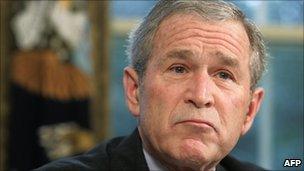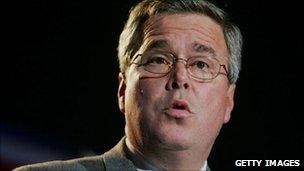Jeb Bush: No run in 2012, but I don't rule out 2016
- Published
Jeb Bush: "I've got a cool last name. That's not a factor in why I'm not running"
It is a truism of political dynasties that there is a chosen heir - the one who should or would or could have been next. It is certainly apt of the Bush family.
Jeb Bush is the son who was groomed for the presidency.
He was the one most Republicans expected to succeed his father into the Oval Office.
And today, looking at their, let's be frank, lacklustre field, many Republicans still wish he would do just that.
"It's very flattering to be asked that regularly," Jeb tells me in his office at the Coral Gables Biltmore Hotel.
"I don't wake up each morning saying, 'Oh, wow, it's me. I think I'm the cat's meow. I'm the best'," he adds.
"There are great candidates running and my guess is that one of them will be president, and I'll be supportive."
What Jeb doesn't say is that the current Republican field would look very different if he were to run.
He certainly has an impressive track record.
As governor of Florida, he turned around the state's badly failing school system.
I'm told that when he took office in 1998, half of the sunshine state's 10-year-olds were "functionally illiterate".
I'm not certain how that's different from non-functionally illiterate, but it sounds bad.
When he left office 10 years later, an overwhelming majority of those young children were reading above the national average.
Jeb Bush is, as he says, a policy wonk on these issues.
A fluent Spanish speaker, he is much loved by Hispanics in the US.
He is personable and smart.
Usefully, he's a social conservative and, as I found standing next to him in the courtyard of his office, he is also very tall.
Several of these attributes would be useful in a run for the presidency.
The problem is that pesky issue of his last name.
Bush dynasty
The Bushes have been at the centre of almost every American presidential election for the past 30 years.
Jeb's father was elected vice-president in 1980, before winning the Oval Office eight years later.

George W Bush, Jeb's brother, left the White House with one of the lowest approval ratings in US history
His brother, George W Bush, went one better and won two terms. Even 2008 was a referendum on the Bush years.
"The gene pool's a little narrow there, right?" Jeb Bush says.
"We live in a very diverse country. You would think we could organise around having other people emerge as leaders," he adds.
But I can't tell you how many Republicans tell me, forget the name, they just wish Jeb Bush would run.
Who knows whether they are right, but they genuinely believe he is the only Republican who could unseat President Barack Obama.
The "draft Jeb" campaign is real but also really wistful.
"It was really the only ambition I had was to be governor," he says.
He deflects the follow up question of whether he has ruled out running in 2016.
"No, but I haven't ruled out being on American Idol either," he says.
Full disclosure, I'm a sucker for politicians who can even feign self-deprecation, especially with a sense of humour. But I confess I was impressed with that one.
'Complex relationship'
The question is: Would the American public be impressed enough with Jeb to overcome a slight queasiness at electing three presidents from the same family?
After all, the country did boot out the Brits a couple of centuries ago, partly in order to get rid of dynastic rule.
But the US has a complex relationship with these things.
Americans tell pollsters they dislike the idea of moving from Bush to Clinton to Bush to Clinton to Bush, etc.

Analysts say Jeb Bush's family name could hurt his chances of winning a presidential election
But in reality, any candidate who wants to win their party's nomination has to win over their party's establishment.
Having the name Bush - or, for that matter, Clinton or Kennedy - opens some doors and closes others.
And certainly, the fact that his brother left office such a divisive president, with some of the lowest approval ratings on record, makes a Jeb victory even harder to imagine.
There is no doubt in my mind that is why he didn't run in 2008, won't run in 2012 but may be tempted to run in 2016.
The further he can get from running as his brother's brother, the better his chances.
When I asked the governor whether he believed Americans would be prepared to vote for another president with the same name, he paused, then replied: "It'd be weird. It'd be different."
It is certainly a symptom of the weakness of the Republican field that Jeb is even being talked about.
But it suggests something more as well - something subtle and ambiguous in the American political psyche.
This is a republic that prides itself on being a meritocracy, but scratch a little and you find a fondness for old families and dynastic tradition. Even for royal weddings.
And that is what makes the fate of Jeb Bush such a fascinating puzzle.
- Published2 June 2011
- Published14 June 2011
- Published14 June 2011
- Published3 January 2012
- Published8 June 2011